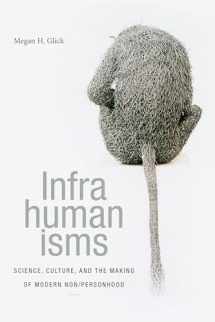
Infrahumanisms: Science, Culture, and the Making of Modern Non/personhood (ANIMA: Critical Race Studies Otherwise)
Book details
Summary
Description
In Infrahumanisms Megan H. Glick considers how conversations surrounding nonhuman life have impacted a broad range of attitudes toward forms of human difference such as race, sexuality, and health. She examines the history of human and nonhuman subjectivity as told through twentieth-century scientific and cultural discourses that include pediatrics, primatology, eugenics, exobiology, and obesity research. Outlining how the category of the human is continuously redefined in relation to the infrahuman—a liminal position of speciation existing between the human and the nonhuman—Glick reads a number of phenomena, from early twentieth-century efforts to define children and higher order primates as liminally human and the postwar cultural fascination with extraterrestrial life to anxieties over AIDS, SARS, and other cross-species diseases. In these cases the efforts to define a universal humanity create the means with which to reinforce notions of human difference and maintain human-nonhuman hierarchies. In foregrounding how evolving definitions of the human reflect shifting attitudes about social inequality, Glick shows how the consideration of nonhuman subjectivities demands a rethinking of long-held truths about biological meaning and difference.


We would LOVE it if you could help us and other readers by reviewing the book
Book review



